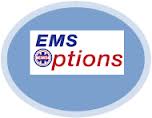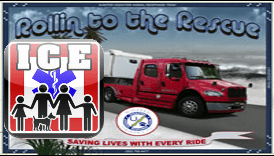 This contribution comes to Situational Awareness Matters by way of a great LinkedIn connection I made recently with Tim Greene, CEO of EMS Options LLC. I found out about Tim and his mission while surfing his bio on LinkedIn. (Yes, I am among the few who actually read about the people I get connected with on social media networks). If you have something to contribute to SAMatters, send it along to me. Pictures and videos that have safety lessons are especially welcomed. Finally, be sure to get connected with me on LinkedIn, Facebook and Twitter (more information at the end of this article). Thanks Tim for your contribution! Good stuff.
This contribution comes to Situational Awareness Matters by way of a great LinkedIn connection I made recently with Tim Greene, CEO of EMS Options LLC. I found out about Tim and his mission while surfing his bio on LinkedIn. (Yes, I am among the few who actually read about the people I get connected with on social media networks). If you have something to contribute to SAMatters, send it along to me. Pictures and videos that have safety lessons are especially welcomed. Finally, be sure to get connected with me on LinkedIn, Facebook and Twitter (more information at the end of this article). Thanks Tim for your contribution! Good stuff.
ICE (In Case of Emergency) Is NOT just for the patients!
 As you may know, ICE is a critical concept that enables EMS personnel, such as yourself, to identify victims, contact next of kin, guardians or other entrusted persons to obtain important medical information or make emergency notifications. Well, I am here to tell you that it is “NOT” just for patients, “IT IS FOR EMERGENCY RESPONDERS TOO!”
As you may know, ICE is a critical concept that enables EMS personnel, such as yourself, to identify victims, contact next of kin, guardians or other entrusted persons to obtain important medical information or make emergency notifications. Well, I am here to tell you that it is “NOT” just for patients, “IT IS FOR EMERGENCY RESPONDERS TOO!”
After retiring with over 30 years in Fire/EMS, I was confronted with a situation where my wife arrested at home as a result of a subarachnoid bleed. I witnessed it and due to my professional training, I was able to start the chain of survival with my daughter’s help. After a quick response from a deputy and his AED, we were able to convert v-fib to a regular rhythm and the EMS crew helped get her to the hospital alive. (After surgery and a long hospitalization, she is now doing well!)
I kicked into a professional mode (just like you would have) that morning and I was doing fine until I was asked to detail her medical history, medications, doses, surgeries and past hospitalizations. I did all right, but it left me thinking that my family and I should have been better prepared for this type of event, just as I have recommended to my patients.
 The point of my story is…. Unfortunately, this will happen to some of you! Being an EMS responder does not shield you from the things that you see every day, we are part of this human race, whether we believe it or not! We need to lead by example and take our own advice to be prepared for the unknown.
The point of my story is…. Unfortunately, this will happen to some of you! Being an EMS responder does not shield you from the things that you see every day, we are part of this human race, whether we believe it or not! We need to lead by example and take our own advice to be prepared for the unknown.
Tim’s TIP’s for you:
- ACCEPT THE FACT THAT YOU ARE HUMAN…it really feels pretty good!
- Prepare yourself and your loved ones for that unforeseen medical event, putting ICE numbers in your cell phones and if you have a smart-phone, download a smart-ICEtm type application that will allow you to put in more than just the telephone numbers.
- Get “ICE” cards that you can carry in your wallet or purse for all of your family members and fill them out. (Even if you put it in your cell phone….THINK REDUNDANCY!)
- Print out a detailed list of pertinent medical information for your family members and keep it with you at all times! (Run sheets are excellent for this, or go to http://www.ice4safety.com for free ICE cards and DIY “Do it yourself” tools.)
- Finally, share this message with other EMS Responders; they might not be aware of the “ICE” concept, or think it could happen to them!
I know the old saying… “I always put my patient’s first”, but you can’t help them if you aren’t prepared yourself. Embrace the “ICE” concept and it will help minimize the confusion in a personal traumatic event and allow you to focus on the more important things….like saving lives!
About the author
Tim Green is a former EMS Director with over 30 years experience as a firefighter/paramedic and is a graduate of the National Fire Academy (NFA) EMS Leadership, Advanced Leadership Issues and Command and Control of Fire Department Operations Courses. He has an associate degree in Fire Sciences and Emergency Medical Services, has completed multiple leadership courses at the Ohio Fire Academy and the Ohio State University, Management Series, before retiring and becoming involved in building a high performance EMS transport billing company. Tim is now CEO of EMS Options, LLC, dedicated to helping people prepare for emergency events. Found at www.ems-options.com or tim_green@ems-options.com.
_____________________________________________________

If you are interested in taking your understanding of situational awareness and high-risk decision making to a higher level, check out the Situational Awareness Matters Online Academy.
CLICK HERE for details, enrollment options and pricing.
__________________________________
Share your comments on this article in the “Leave a Reply” box below. If you want to send me incident pictures, videos or have an idea you’d like me to research and write about, contact me. I really enjoy getting feedback and supportive messages from fellow first responders. It gives me the energy to work harder for you.
Thanks,

Email: Support@RichGasaway.com
Phone: 612-548-4424
SAMatters Online Academy
Facebook Fan Page: www.facebook.com/SAMatters
Twitter: @SAMatters
LinkedIn: Rich Gasaway
Instagram: sa_matters
YouTube: SAMattersTV
iTunes: SAMatters Radio
iHeart Radio: SAMatters Radio

After performing CPR on an employee that had a heart attack at work I was faced with trying to contact his family. The employee had not updated his emergency contacts in his HR file so no numbers were readily available. Fortunately I had his cell phone but his phone book was just a long list of names. The most grueling part of this event was sitting in my office and calling each number to see if I could get an answer from a family members. I called everyone from car mechanics to painters to food delivery and left countless messages hoping someone would contact me. Exhausted from the day I went home worrying about my employee at the hospital alone with no family. It was well over 6 hours before I got the call back from an uncle that started the communication to the rest of his family. Every year I train our employees on using ICE for their cell phone numbers, keeping emergency contacts up to date at work and putting a written card of medical information and contacts in their wallet. When time is of the essence for survival or worse to make family aware of a tragic event these ICE practices can make all the difference. Great article!
Patrick,
Great lesson shared!
Rich